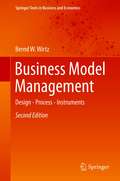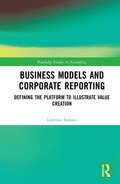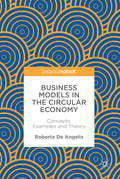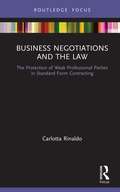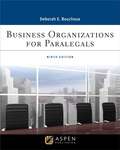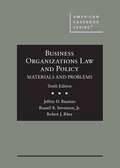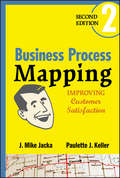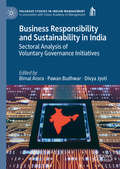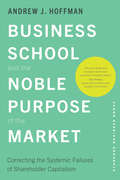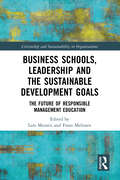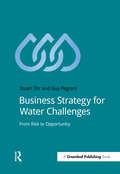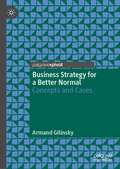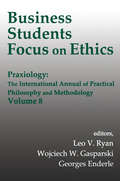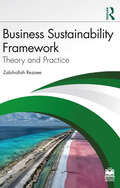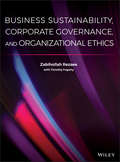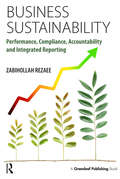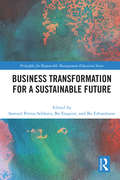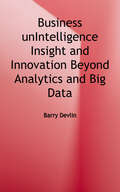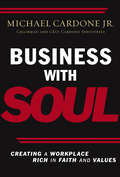- Table View
- List View
Business Model Management: Design - Process - Instruments (Springer Texts in Business and Economics)
by Bernd W. Wirtz“How are business models purposeful designed and structured? How can the models be implemented professionally and managed successfully and sustainably? In what ways can existing business models be adapted to the constantly changing conditions? In this clearly structured reference work, Bernd W. Wirtz gives an answer to all these issues and provides the reader with helpful guidance. Although, ‘Business Model Management’ is first and foremost a scientific reference book, which comprehensively addresses the theory of business models, with his book Bernd W. Wirtz also turns to practitioners. Not least, the many clearly analyzed case studies of companies in different industries contribute to this practical relevance. My conclusion: ‘Business Model Management’ is an informative and worthwhile read, both for students of business administration as a textbook as well as for experienced strategists and decision makers in the company as a fact-rich, practical compendium.” Matthias Müller, Chief Executive Officer Porsche AG (2010-2015), Chief Executive Officer (2015-2018) Volkswagen AG“In dynamic and complex markets a well thought out business model can be a critical factor for the success of a company. Bernd Wirtz vividly conveys how business models can be employed for strategic competition and success analysis. He structures and explains the major theoretical approaches in the literature and practical solutions in an easy and understandable way. Numerous examples from business practice highlight the importance of business models in the context of strategic management. The book has the potential to become a benchmark on the topic business models in the German-speaking world.” Hermann-Josef Lamberti, Member of the Board Deutsche Bank AG 1999-2012/ Member of the Board of Directors, Airbus Group “The business environment has become increasingly complex. Due to changing conditions, the executive board of a company is confronted with growing challenges and increasing uncertainty. Thus, a holistic understanding of the corporate production and performance systems is becoming more and more important. At this point, Bernd W. Wirtz introduces and presents the concept of the structured discussion of the own business model. Business models present operational service processes in aggregated form. This holistic approach channels the attention of management, supports a sound understanding of relationships and facilitates the adaption of the business to changing conditions. The management of business models is thus an integrated management concept. Through the conceptual presentation of complex issues the author makes a valuable contribution to the current literature. In particular, the referenced case studies from various industries make the book clear and very applicable to practice.” Dr. Lothar Steinebach, Member of the Board, Henkel AG 2007-2012/ Supervisory Board, ThyssenKrupp AG
Business Models and Corporate Reporting: Defining the Platform to Illustrate Value Creation (Routledge Studies in Accounting)
by Lorenzo SimoniThis book discusses the role of business models in corporate reporting. It illustrates the evolution of non-financial reporting, the importance of business model reporting, and the main conceptualisations of business models. It also offers a methodological contribution to the assessment of business model reporting. Finally, it discusses the main implication of business model reporting for different categories of subjects and some challenges related to this kind of disclosure. Readers will understand the role of business models in the non-financial reporting landscape. They will also gain an understanding of how business models can help users of the annual report contextualise other non-financial items disclosed. However, effective business model reporting implies paying attention to certain features that define its quality. This theme is discussed in the empirical part of the book and in the section devoted to implications for preparers, users, and regulators. As large companies in the EU and the UK have to disclose the business model in the annual report, this book will be of interest to preparers and users of financial statements, regulators involved in the ongoing non-financial regulatory process, and professional bodies. It will also be of interest to academics interested in the investigation of non-financial reporting.
Business Models in the Circular Economy: Concepts, Examples and Theory
by Roberta De AngelisThis book focuses on the role of corporations in the transition towards an economy that works more in line with ecological limits. It is centred on business model innovation in the context of the circular economy, which is gaining consensus across business, policy and academic circles by proposing more resource efficient industrial processes. Interest in circular business models is growing within academic and practitioner literature yet the concept is not clearly understood, with potential negative consequences for theory building and practical implementation. Therefore, this book conceptualises circular business models and investigates their theoretical foundations in relation to the rationale for adopting them, drawing on circular economy, business model, strategic management and neo-institutional literature and secondary data.
Business Negotiations and the Law: The Protection of Weak Professional Parties in Standard Form Contracting (Young Feltrinelli Prize in the Moral Sciences)
by Carlotta RinaldoBusiness Negotiations and the Law: The Protection of Weak Professional Parties in Standard Form Contracting aims to explore the issues surrounding contract negotiations between entrepreneurs and other professionals when one of the parties does not have the same level of bargaining power as the other. The need to protect weaker parties from unfair contract terms exists not only in relationships between businesses and consumers, but in business to business contracts also. This book focuses on the problem of small enterprises, independent contractors and other professional weak parties and examines these from a European point of view. There are significant differences between Member States as to decisions regarding regulatory context on the protection of weaker professional parties in asymmetrical contractual situations. However, European businesses are overwhelmingly smaller in size, so protecting weaker parties becomes key in facilitating successful and efficient negotiations. The book provides a critical and comparative overview of the area and recent regulatory developments, both to clarify the direction that European legislation is heading, and to explore the tools needed to assure the effectiveness of the common market. This text will be of interest to policy makers, researchers of European legislation, and students of commercial and business law.
Business Networks Reloaded
by Stefanie Jung Peter KrebsBusiness networks are an important economic phenomenon of increasing practical importance throughout Europe. This volume examines business networks from an interdisciplinary perspective, with many contributions dealing with a certain form of business network, the so-called cooperative or non-hierarchical. With regard to this specific form of cooperation the volume presents new economic findings, proposes a definition and discusses the governance structure of those networks.Moreover, this book explores whether the research results can also be applied to hierarchical, centralized business networks. With medium-sized companies and all the more with large companies, business networks also pose the question of the compatibility with anti-trust law. This collection dedicates three contributions to this important question. They are complemented by chapters on liability of the network and its members towards third parties and contributions discussing duties of loyalty and the interpretation of agreements. Drawing on new research from Italy, Spain, Germany and Norway, this work illustrates the European legal perspective on business networks.
Business Organizations
by Theresa A. Gabaldon Christopher L. SagersBusiness Organizations, Third Edition is a pedagogically rich book that recaptures student engagement in the course without sacrificing basic rigor. The traditional coverage of most books in the field is retained, but modernized in reflecting the importance of unincorporated entities and small business counseling problems. Transaction-oriented problems put the student in the practice role of advising a variety of businesses. An expository approach provides clear context for cases. <p><p>Features include flowcharts, connections boxes, self-testing exercises, an interspersed series of exercises on ethics for business lawyers, a glossary of terms, and sidebars on numerical concepts and skills. Through the use of sidebar explanations or otherwise, the chapters or major sections of chapters in the book stand alone, facilitating teaching in almost any order. An online supplement includes a “business concepts for lawyers” module to be assigned as an instructor desires, as well as a variety of sample documents to show students the actual materials that lawyers work with every day.
Business Organizations For Paralegal (Aspen Paralegal Series)
by Deborah E. BouchouxBusiness Organizations for Paralegals, Ninth Edition
Business Organizations Law and Policy: Materials and Problems
by Jeffrey Bauman Russell Stevenson Jr. Robert RheeThe Tenth Edition continues the basic approach of its predecessors: using problems as a vehicle for discussing cases and textual material to develop an understanding of the law of business enterprises and the policy issues that influence its evolution. The new edition continues to develop sophisticated materials on noncorporate business entities, and it adds significant new cases and commentary on new developments in law including Delaware cases on information rights, shareholder litigation, and the Caremark doctrine. The commentary has been updated for new developments including discussion of the role of corporations in society and the influence of and trends in shareholder proposals. It also made modest organizational changes that streamline the sequential delivery of important lessons.
Business Practice in Socialist Hungary, Volume 1: Creating the Theft Economy, 1945–1957 (Palgrave Debates in Business History)
by Philip ScrantonThis study aims to reconstruct the activities of enterprises and individuals over two decades in one developing country (Hungary), within and across four politico-economic domains (agriculture, infrastructure/construction, commerce, and manufacturing), from the initial Stalinist obsession with heavy industry (Volume 1: Creating the Theft Economy, 1945-1957) through later reforms paying greater attention to profitable farming and the provision of abundant consumer goods (Volume 2: From Chaos to Contradiction, 1957-1972, forthcoming 2023). It provides hundreds of grounded, granular stories for reflection, as reported by actors and direct observers, ranging from innovation and improvisation to obstruction, failure, and fraud. Further, it offers an otherwise-unobtainable close encounter with another world, familiar in some respects while amazingly peculiar in others. The social history of enterprise and work in postwar Central European nations “building socialism” has long been underdeveloped. Through extensive macro-level research on planning and policy in Hungary, Poland, Czechoslovakia, and other Bloc countries, a grand narrative has been framed: reconstruction and breakneck industrialization under Soviet tutelage; then eventual mismanagement, stagnation and crisis, leading to collapse. This book seeks to explore what socialism actually looked like to those sustaining (or enduring} it as they faced forward into an unknowable future, to assess how and where it did (or didn’t) work, and to recount how ordinary people responded to its opportunities and constraints. This study will appeal to readers interested in understanding how businesses worked day-to-day in a planned economy, how enterprise practices and technological strategies shifted during the first postwar generation, how novice managers and technicians emerged during rapid industrialization, how peasants learned to farm cooperatively, how organizations improvised and adapted, how political purity and practical expertise contended for control, and how the controversies and convulsions of the postwar decades shaped a deeply flawed project to “build socialism.”
Business Principles for Legal Nurse Consultants
by Jan Aken Kathie W. Condon Patricia W. IyerWith the interdisciplinary challenges required of legal nurse consulting, starting a business in this field requires yet another set of tools: knowledge of running a business. In this book, successful practicing LNCs share the benefit of their rich experience in starting up and maintaining an LNC business. They discuss developing a business plan, suggestions for marketing and advertising, building a Web site, technology issues, employees and contractors, maintaining cash flow, navigating the ethical minefield, managing change, developing and strengthening relationships with attorneys, and the role as an expert witness. This authoritative guide is a must for meeting the challenges of a new business.
Business Process Mapping
by Jacka J. Mike Keller Paulette J.Praise For Business Process Mapping: Improving Customer Satisfaction, Second Edition "A must-read for anyone performing business process mapping! This treasure shares step-by-stepapproaches and critical success factors, based on years of practical, customer-focused experience. A real winner!" -Timothy R. Holmes, CPA former General Auditor, American Red Cross "Paulette and Mike make extensive use of anecdotes and real-life examples to bring alive the topic ofbusiness process mapping. From the outset, this book will engage you and draw you into the worldof business process mapping. Who would have thought that reading about business process mapping could make you smile? Well, Mike and Paulette can make it happen! Within each chapter, theauthors provide detailed examples and exhibits used to document a process. Each chapter also includes a 'Recap' and 'Key Analysis Points' which enable the reader to distill the highlights of the chapter. " -Barbara J. Muller, CPA, CFE, Senior Lecturer, School of Accountancy W. P. Carey School of Business, Arizona State University "Keller and Jacka cut through the drudgery of process mapping with a path-breaking approach thatenables the reader to better understand processes, how they work and how they work together toward successful achievement of business objectives. With great style and flair, this book will provide youwith a different way of thinking and new tools to assist you in process analysis and improvement. This book is a must-read for auditors, risk managers, quality improvement management, and businessprocess engineers. " -Dean Bahrman, VP and Internal Audit Director (Retired) Global Financial Services Companies "Mike Jacka and Paulette Keller show their expertise with the application of business process mappingin increasing customer service and satisfaction in this updated and expanded edition of this popular book. With clear, practical examples and applications, this book shows the writing talents of bothauthors, and it will be used over and over by those from all lines of industries and professions. Kudos for a job well done!" -Joan Pastor, PhD, Founding Partner, Licensed Industrial-Organizational Psychologist JPA International, Inc. , Beverly Hills, California
Business Responsibility and Sustainability in India: Sectoral Analysis of Voluntary Governance Initiatives (Palgrave Studies in Indian Management)
by Pawan Budhwar Bimal Arora Divya JyotiOn the backdrop of the institutionalisation of corporate social responsibility (CSR) and sustainability, and the emergence of multi-stakeholder-driven voluntary regulation, this timely collection places special emphasis on India and explores its international voluntary sustainability standards. The authors analyse the adoption and implementation of voluntary governance initiatives across a range of industries, offering insightful sectoral discussion and evaluation of voluntary sustainability standards as forms of transnational private regulation. This book will be of interest to anyone researching CSR, sustainability and supply chain management in emerging markets.
Business School and the Noble Purpose of the Market: Correcting the Systemic Failures of Shareholder Capitalism
by Andrew J. HoffmanThe intellectual foundation for the next generation of business leaders Today's business schools were designed for a world that no longer exists. Capitalism raised the standard of living for billions of people over the past 150 years, but is now causing systemic challenges it is unable to address, including climate change and inequality. And yet, business schools continue to teach ideas that are making things worse: elevating the primacy of shareholder profits above the interests of employees, the environment, and society; viewing government as an intrusion on the free market rather than an arbiter of its proper functioning; and promoting unlimited economic growth despite the devastating environmental and social consequences. Business schools cannot simply drop an elective into their curriculum to address these challenges. We must rethink the faulty foundations. Business School and the Noble Purpose of the Market explains the intellectual foundation MBA students, faculty, and administrators need to reform capitalism and restore its noble purpose for the 21st century. Many business students are in fact seeking this kind of education and frustrated that they are not getting it from their professors. This book will fill in gaps in their education, equipping them with the models and mindset to rethink shareholder capitalism and serve society's needs. Business faculty and administrators will find a practical program for amending curriculum and pedagogy, changing student and faculty rewards, and bringing a new spirit and sensibility to the business school.
Business Schools, Leadership and Sustainable Development Goals: The Future of Responsible Management Education (Citizenship and Sustainability in Organizations)
by Frans Melissen Lars MoratisBusiness Schools, Leadership and Sustainable Development Goals: The Future of Responsible Management Education is the second book in the series Citizenship and Sustainability in Organizations: Exploring and Spanning the Boundaries. It contains chapters from various scholars and practitioners in the field of responsible management education (RME). Through introspection, through celebrating successes and learning from failures (retrospection) and through looking forward (prospection), it aims to inspire a future of management education and leadership development that demonstrates its relevance to sustainable development. In doing so, it touches upon the grand societal challenges of our time, as illustrated by the United Nations Sustainable Development Goals, and discusses how business schools, and other providers of management education, could and should contribute to overcoming these challenges. It argues that management education needs to educate future leaders in a way that no longer hampers but truly accelerates the process of sustainable development. This book offers a collection of thought-provoking ideas, vivid stories (including personal accounts and experiences), and appealing and engaged forecasts, visions and ideas about management education and leadership development for sustainability. Hence, it is a must-read for anyone interested in or involved in RME.
Business Secrets Management: Strategies to Protect, Extract and Maximize Value (Management for Professionals)
by Graham Bell Pierre Ollivier Sylvain Roy Victor De LeonDid you know that the mishandling of business secrets can cost companies millions, yet the right strategies can unlock untapped value? To navigate this critical aspect effectively, this book provides practical strategies for managing Business Secrets during product launches, finance raising, and M&A activities. It simplifies complex legal concepts into actionable insights, helping decision-makers in small to medium-sized companies, scale-ups, and academic institutions leverage these secrets for value creation. With minimal legal jargon, the book offers a clear, practical approach that enhances communication between business leaders and legal teams. It includes recent case studies across various industries, contributed by global experts, making it an essential resource for managers and legal experts seeking to bridge the gap between technical details and strategic business applications.
Business Strategy for Water Challenges: From Risk to Opportunity (Doshorts Ser.)
by Stuart Orr Guy PegramWater is a resource under increased stress, with its management now cited as one of the greatest risks to business continuity and growth. This concise guide for professionals offers strategic steps for developing a corporate water stewardship strategy. It will enable you to: define business water risks, and the opportunities associated with those risks; explore, through sector-specific profiles, risks associated with regulation, reputation, external response and engagement, and physical incidents; develop a clear plan and process for creating, managing and mainstreaming a corporate water strategy; identify several initiatives and new risk tools that your company can use to stay on top of best practice in water management. With the advent of risk tools, and a growing list of testaments around business risk from water, we are now able to respond more appropriately to how this resource is impacted by and impacts upon business. Use this book as your guide as you begin to build your company's strategy around water.
Business Strategy for a Better Normal: Concepts and Cases
by Armand GilinskyThis book examines how leaders can use strategic thinking to transform their followers, organizations, and industries in the wake of societal shocks like COVID-19 that require re-balancing both leadership and business models. It is organized around a new triumvirate of strategic thinking concepts for the better normal, explained in a 3S Model: Style, Situation, and Strategic Orientation. The environment (situation) creates or deters opportunities that are pursued by leaders with the propensity (style) and the potential (strategy) to develop them. In the face of ongoing crises such as COVID-19, natural disasters, political upheaval, and climate change, the author proposes that the field of strategic management needs to rethink and update traditional frameworks in order to offer business models more applicable in a rapidly changing environment. Addressing topics such as sustainability and diversity, this pivotal text fills a gap in strategic thinking and presents illustrative examples and case studies about organizations grappling with making decisions in a dynamically different “new normal.”
Business Students Focus on Ethics (Praxiology: The International Annual Of Practical Philosophy And Methodology Ser. #Vol. 8)
by Wojciech W. GasparskiThe study of business ethics seeks to understand business institutions, practices and activities in light of normative behavior. The ethical concern is for the rightness or wrongness of human action. Business Students Focus on Ethics brings together essays written by twenty-five MA and MBA students from seven countries in Europe, North and South America, and the Pacific Rim. Collectively, they give us an applied business ethics framework, one with international dimensions.Business Students Focus on Ethics achieves a number of objectives: it recognizes ethics as legitimate content in graduate level studies in business world wide; seriously examines specific ethical concerns by young managers; and reflects on these concerns from across cultural and geographic borders. It also demonstrates the quality of their analysis and recommendations.The essays in this volume are arranged into four interrelated groups. The first group, "Praxiological and Ethical Framework," examines issues of human action from both the theory of human action (i.e., praxiological) and ethical dimensions. The section group of essays, "Social Issues-Compensation and Labor," discuss applications of praxiological and ethical principles in relation to the ethical responsibilities of business. The third group discusses "Ethical Issues in Health Care" from three different cultural perspectives. The fourth group is a series of "Corporate Case Studies." This volume may be seen as a companion to Volume 5 of the Praxiology series, Human Action in Business and will be of interest to business people, economists, policy makers, social scientists and students of philosophy and ethics.
Business Sustainability Framework: Theory and Practice
by Zabihollah RezaeeProviding a practical and accessible introduction to a complex yet essential area, Business Sustainability Framework enables readers to integrate and report on sustainability from business and accounting perspectives.The author explores how organizations of all sizes can adopt an integrated strategic approach to business sustainability, encompassing planning, performance, reporting, and assurance. Grounded in the latest research, the book includes topics such as shareholder and stakeholder governance models, business sustainability factors and initiatives, sustainability theories, standards and best practices, the use of AI, and financial reporting and auditing initiatives.An ideal introduction for advanced undergraduate and graduate students of sustainability governance, performance, risk, reporting, and assurance, this textbook equips readers with the knowledge and skills necessary to become successful business leaders in sustainability.
Business Sustainability, Corporate Governance, and Organizational Ethics
by Zabihollah RezaeeA comprehensive framework for understanding the most important issues in global business In today's business environment, multinational corporations are under pressure from investors, lawmakers, and regulators to improve their corporate governance, business sustainability, and corporate culture. Business sustainability, corporate governance, and organizational ethics are taking center stage in the global business environment. This long-awaited text covers each of these three important areas in detail, guiding readers to a robust understanding with features including chapter summaries, essential terms, discussion questions, and cases for each topic covered.
Business Sustainability: Performance, Compliance, Accountability and Integrated Reporting (Issn Ser.)
by Zabihollah RezaeeBusiness sustainability has advanced from greenwashing and branding to being a business imperative. Stakeholders, including shareholders, demand, regulators require, and companies now need to report their sustainability performance. No longer is this a choice for businesses. A decade ago, fewer than 50 companies released sustainability reports, and now more 8,000 global public companies disclose sustainability performance information on some or all five economic, governance, social, ethical, and environmental (EGSEE) dimensions of sustainability performance, and this trend is expected to continue. Indeed, more than 6,000 European public companies would be required to disclose their environmental, social, governance and diversity information for their 2017 reporting year. However, the proper determination of sustainability performance, accurate and reliable reporting and independent assurance of sustainability information remain major challenges for organizations of all types and sizes. Through reading this book, you will: Identify sustainability strategies to create innovation in new products, services, energy-efficiency, environmental facilities and green initiatives. Understand the role and responsibilities of all participants in the corporate reporting process, including directors, officers, internal auditors, external auditors, legal counsel, and investors. See ways to improve public trust, investor confidence, business reputation, employee satisfaction, corporate culture, social responsibility and environmental performance. Learn all five economic, governance, social, ethical and environmental (EGSEE) dimensions of sustainability performance separately and their integrated and interactive effects on achieving the goal of creating sustainable value for all stakeholders, including shareholders. Learn how to adopt best practices in sustainability development and performance, and deliver effective integrated sustainability reporting and assurance.
Business Tenancies
by Russell HewitsonA considerable amount of commercial property work is concerned with the renewal of business tenancies under Part II of the Landlord and Tenant Act 1954. Business Tenancies provides the busy practitioner with a detailed and practical guide to all aspects of the law and procedure involved in the renewal of business tenancies under the 1954 Act and the often complex issues which can arise. It offers practical answers to problems which commercial property professionals may encounter when dealing with renewals. This new title will equip commercial property professionals with a thorough practical knowledge of the relevant statutory provisions and case law. The implications of the Civil Procedure Rules 1998 are considered in detail. It also deals with the right to compensation for improvements. The text takes into account recent case law as well as the reforms introduced by the Regulatory Reform (Business Tenancies) (England and Wales) Order 2003.
Business Transformation for a Sustainable Future (The Principles for Responsible Management Education Series)
by Samuel Petros SebhatuInterconnecting the concepts of sustainability, innovation and transformation, this book explains how organizations have successfully transformed themselves and wider society to foster a more sustainable future, and identifies the difficulties and challenges along the way. Part of the Principle of Responsible Management Education (PRME) series, the book promotes a strong voice for meeting sustainability challenges for transformative change in a globalized world through business education and practice. A transition to a more sustainable way of doing business can only be attained by combining technology with profound system innovations and lifestyle changes. The chapters in the book, each written by a strong and well-recognized team of researchers in the field, open up the discussion about a new partnership between sustainability, innovation, and transformation that includes the global society (big world), the biosphere (small planet), and also requires a deep mind shift. The book presents cases from business (including Ikea and Eataly) and other service networks including the Base of the Pyramid (BoP), and illustrates how these organizations have transformed themselves for a sustainable future. The research perspectives are macro (policies and legislation), meso (institutional practices) and micro (business practices and individual behavior). This book is where research meets real-world business and societal practice. The chapters are grounded in business research, specifically the interdependencies between sustainability, innovation, and transformation, which makes for a robust basis for describing, explaining, and understanding the complex challenges faced by business and society in the 21st century. The book is intended for graduate- and postgraduate-level students and executive education with implications for practitioners. Furthermore, it contributes to multidisciplinary research in the field of interaction between business and society with a view to extending the firm-centric view to encompass a broader, systemic, and dynamic understanding of business and societal transformation.
Business Unintelligence: Insight and Innovation Beyond Analytics and Big Data
by Barry DevlinBusiness intelligence (BI) used to be so simple—in theory anyway. Integrate and copy data from your transactional systems into a specialized relational database, apply BI reporting and query tools and add business users. Job done. No longer. <p><p>Analytics, big data and an array of diverse technologies have changed everything. More importantly, business is insisting on ever more, ever faster from information and from IT in general. An emerging biz-tech ecosystem demands that business and IT work together. <p><p>This book reflects the new reality that in today's socially complex and rapidly changing world, business decisions must be based on a combination of rational and intuitive thinking. Integrating cues from diverse information sources and tacit knowledge, decision makers create unique meaning to innovate heuristically at the speed of thought. This book provides a wealth of new models that business and IT can use together to design support systems for tomorrow's successful organizations. <p><p>Dr Barry Devlin, one of the earliest proponents of data warehousing, goes back to basics to explore how the modern trinity of information, process and people must be reinvented and restructured to deliver the value, insight and innovation required by modern businesses. From here, he develops a series of novel architectural models that provide a new foundation for holistic information use across the entire business. From discovery to analysis and from decision making to action taking, he defines a fully integrated, closed-loop business environment. <p><p>Covering every aspect of business analytics, big data, collaborative working and more, this book takes over where BI ends to deliver the definitive framework for information use in the coming years.
Business With Soul: Creating a Workplace Rich in Faith and Values
by Michael CardoneFaith. Prayer. Generosity. Servant leadership . . . While such words rarely make the cut in today's business acumen, CARDONE Industries has put them into action for nearly four decades to build one of the nation's most successful manufacturing firms.With more than 5,000 employees worldwide, Michael Cardone Jr., president of CARDONE Industries, argues that no matter the economic climate, leaders can establish sound principles that will strengthen any company's bottom line. Cardone writes, "Deep within, I know I am a 'businessman with a soul,' and as a natural extension of myself, I want to create a 'business with soul.'" And what he started with his father 40 years ago is more profitable, better focused, and stronger than ever.In Business with Soul, Cardone introduces the Triple Bottom Line--among other principles--as he challenges leaders to measure their company's success by its financial, social, and spiritual prosperity. In an engaging and relevant conversation on leadership essentials, he shares practical, profitable ideas that will help you:Identify the greater purpose for your businessDevelop servant leadership across company linesCommunicate effectively to management, employees, and customersBuild morale, inspire creativity, and boost retentionPursue excellence and exceed customer expectationsImprove business by drawing more from God's infinite wisdomPacked with valuable insight, practical examples, and tools you can implement in your company. Business with Soul is a plan for not only surviving in business today?but thriving in ways you only imagined.
